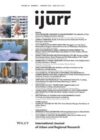Innovations in democratic participation involving small‐scale, long‐term focused governing bodies have increased citizen influence in poor American urban neighborhoods. Scholars have described these emerging forms of participation as essentially cooperative in spirit and directly democratic in nature. I argue that the new participatory regimes continue to involve social processes of representation and conflict inherent to more traditional forms of engagement. Participants move dynamically between cooperation and conflict and between participating as individuals and representing constituencies. This article presents a careful study of how a single decision developed and was implemented in such a participatory experiment, the American Street Empowerment Zone in Philadelphia, Pennsylvania, USA, between 1994 and 2008. Archival and interview data support the general perspective shared by articles in this symposium — that participation involves dynamic movement between conflict and cooperation. This article suggests that the durability of the participatory regime depends not on the level of conflict but on how participants move between displaying identification with either government or their community constituents. This article uses the concept of intermediation to describe this kind of dynamism and to reflect the flexibility a participatory structure must nurture to endure.
Details
Written by:
DEBBIE BECHER
Digital Object Identifier (DOI)
10.1111/j.1468-2427.2010.00965.x
About DOI
Read full article as PDF
Read full article as HTML
See the references for this article
